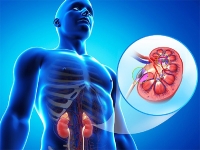According to kidney stone doctors, the chances of having recurrent kidney stones are about 70-80 percent once people suffer their first stone attack. After the first kidney stone attack occurs in people they have a cumulative 10 percent chance per year of forming another stone (if no other stones are present at the time of the first stone attack). This translates into a 50% chance over a 5 year period of time. Family genetic tendencies can increase this risk.
The younger a person is when the first kidney stone attack happens, the greater is the personal risk of having additional attacks. Those between the ages of 35 and 50 are in their peak stone formation period.
Historically about 60 percent of individuals who have experienced one kidney stone will develop another within 7 years. But whereas just a few years ago recurrence of kidney stones was unavoidable, modern medical science has made recurrent kidney stones a preventable disease. With individualized medical therapy recurrence can be prevented in more than 95 percent of sufferers.
The people who are particularly likely to keep on developing kidney stones includes people who:
- eat a high-protein, low-fibre diet
- are inactive or bed-bound
- have a family history of kidney stones
- have had several kidney or urinary infections
- have had a kidney stone before, particularly if it was before you were 25
- have only one fully working kidney
- have had an intestinal bypass (surgery on your digestive system), or a condition affecting the small intestine, such as Crohn’s disease
There’s evidence to suggest that certain medications may increase your risk of developing recurrent kidney stones. These include:
- aspirin
- antacids
- diuretics (used to reduce fluid build-up)
- certain antibiotics
- certain antiretroviral medication (used to treat HIV)
- certain anti-epileptic medication
Types of kidney stones
As per kidney specialists, kidney stones can develop for a number of reasons. The causes of the four main types of kidney stone are outlined below.
Calcium stones
Calcium stones are the most common type of kidney stone and form if there’s too much calcium in the urine, which can be due to:
- an inherited condition called hypercalcuria, which leads to large amounts of calcium in urine
- an overactive parathyroid gland (the parathyroid glands help to regulate the amount of calcium in your body)
- kidney disease
- a rare condition called sarcoidosis
- some cancers
Calcium stones are usually either large and smooth or spiky and rough.
Struvite stones
Struvite stones are often caused by infections, and they most commonly occur after a urinary tract infection that’s lasted a long time.
Struvite stones are more common in women than men.
Uric acid stones
Uric acid stones can form if there’s a large amount of acid in your urine. They may be caused by:
- eating a high-protein diet that includes lots of meat
- a condition such as gout that prevents the body breaking down certain chemicals
- an inherited condition that causes higher than normal levels of acid in the body
- chemotherapy
Cystine stones
Cystine stones are the rarest type of kidney stone. They’re caused by an inherited condition called cystinuria, which affects the amount of acid that is passed in your urine.






Leave A Comment
You must be logged in to post a comment.